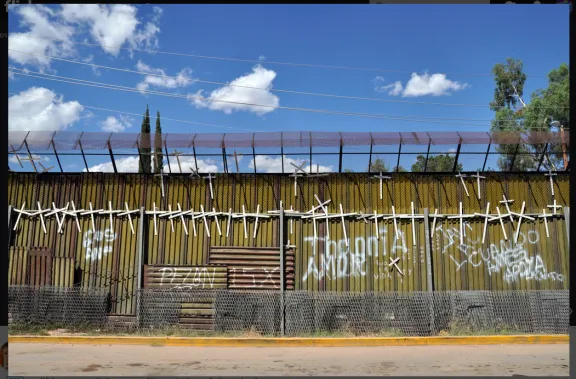
Decolonizing Our Flesh
A word on science, art-making, and Trump’s wall: The metaphor most commonly used by educators to describe the selective permeability of the cell membrane is that of border control.
You’ll remember the cliché from biology class: the cell is a city and all the organelles have municipal functions. Lysosomes remove garbage, ribosomes produce currency, transportation occurs along the highway system of the smooth and rough ER, and a nucleus dictator orders these functions.
The membrane, the city's “border police,” maintains cellular homeostasis by keeping the “bad” stuff out and the “good” stuff in.
When I encounter these kinds of metaphors in a classroom or textbook I get an uneasy sense that the actual atrocity at the Texas-Mexico border is somehow downplayed.
At the same time, I get the sense that an important point has been illustrated: the borderlands are not only a geography where our government murders immigrants, but also a symbolic territory written in our flesh.
My purpose is not to shame educators for imparting to children narratives of imperialism where they don’t belong, but to show how projecting someone else’s trauma as a way of understanding our own bodies might be harmful.
Do we even have an alternative metaphor for understanding microbes? Or do we actually need narratives of conquest to understand how eukaryotic cells maintain homeostasis?
I’m not so naïve as to think that if we come up with new ways of talking about our biology we’ll solve immigration politics, or even that using politically appropriate metaphors will erase violence.
But I do think telling new stories, making new metaphors, is an important part of decolonizing our flesh and a worthwhile goal for art, beyond creating something pleasing to look at/hear/take in, since scientists, in my experience, seem mostly uninterested in that task.
So here’s my alternative narrative of selective permeability:
The two (arguably) most important evolutionary leaps on earth — that of prokaryotes to eukaryotes and unicellular to multicellular organisms — happened as a result of "poorly enforced borders."
I want us to tell a story of accidental symbiotic unions that happen when one bacterium engulfs another and, instead of eradicating it, benefits from the energy they can produce together. I want to tell a story of how this odd-couple passed a singular genome, a blueprint for cooperation, to its offspring.
I want to tell a story of how groupings of unicellular organisms had boundary issues and lived in liminal space before becoming a single multicellular being. I want to tell a story of how working together hacked evolution and launched a new era in earth’s ecology.
We owe our eukaryoticity to indigestion and lazy policing, to forming kinship in the face of homeostatic disruption. I love the idea of “chosen family,” so I’m asking that we expand that framework to include organisms, geographies, metabolisms, and taxa that threaten our false promises of power.
I’m asking that we tear down the wall — literal and metaphoric — between us and our significant Others, even if it means the possibility of losing our comfy privileges. Because my body isn’t made of trillions of microscopic dictatorships, each with their own border police.
My body is a queer contact zone, the product of billions of years of unlikely kinship amongst the strangest partners.